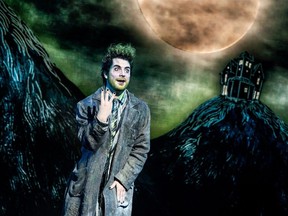Experienced improv theatre veteran Justin Collette leads the cast in the Broadway Across Canada tour in Vancouver.

Reviews and recommendations are unbiased and products are independently selected. Postmedia may earn an affiliate commission from purchases made through links on this page.
Reviews and recommendations are unbiased and products are independently selected. Postmedia may earn an affiliate commission from purchases made through links on this page.
Beetlejuice The Musical. The Musical. The Musical.
When: Jan. 21-26, various times
Where: Queen Elizabeth Theatre, 630 Hamilton St., Vancouver
Beetlejuice, Beetlejuice, Beetlejuice.
Anyone familiar with director Tim Burton’s 1988 offbeat hit horror-com feature of the same name knows repeating that name three times opens a can of inter-dimensional sand worms that may or may not fix the mess created by the namesake title character. The Oscar-winning flick starring Michael Keaton in the lead role returned from the dead last year in the sequel Beetlejuice Beetlejuice, which also made big box office bank.
Proving that there is apparently nothing that can’t be adapted to a stage musical, the story of goth teen Lydia Deetz’s existential joust with a millennia-old demon with a hardcore case of Vaudevillian tendencies was turned into a two-act song and dance experience. Complete with trips to the Netherworld and some calypso conga lines that positively possess the cast, the show has been revived on Broadway twice since its debut.
While adhering to the original film’s storyline, the touring production coming to the Queen Elizabeth expands on the before, now and after lives of the various players. It’s more in-depth than the namesake film.
“I moved to New York City to be in School of Rock on Broadway and auditioned for Beetlejuice and now I’m here,” said Collette. “There is a decade or so in between there, but that is the short story. The unique thing composer and lyricist Eddie Perfect did for the music is he tailored the genre to the characters rather than the reverse, which is not the standard practice.”
In other words, when teen Lydia belts a ballad, it’s got a pop/punk feel. When the straightlaced Maitlands, the ghostly couple haunting her house, has a number it’s classical ‘milquetoast musical theatre’ and so on. As for Collette’s zany demon in the black-and-white-striped three piece suit, he is a genre unto himself.
“Beetlejuice gets some kind of spoken beat poetry, Dylanesque-on-acid, stream of consciousness delivery that the music tries to follow around as well,” he said. “He’s very much his own creation as in the movies.”
Given how Keaton made the character such a signature role, is it hard to separate his version from the stage one?
After all, it’s hard for anyone to go to see the Sound of Music and not compare Maria’s performance to Julie Andrews playing her in the film version. And the Wizard of Oz is practically inseparable from Judy Garland’s Dorothy in the 1939 film.
Collette says it’s easier with Beetlejuice. While the film has its musical moments, it’s not a musical.
“The way you do it is to come in with the goal of not doing a s–ty impression of Michael Keaton in the movie and look at the source material,” he said. “Beetlejuice is a guy who is pretty bored with everything as he’s been alive forever and you can dive into that point of view.
“Writers Scott Brown and Anthony King, who was a member of the Upright Citizens Brigade improv group in New York at a time when people were leaving to go onto SNL, has a really great sense of comedy and making a character who is conversational, modern and connects with the crowd as a narrator as well.”
Admitting that he’s nervous about being in a role that breaks down the wall with directly communicating to the audience, Collette says he’s found a comfortable place within the writers’ concept.
“Yes, there are times when I break down the wall, and communicate directly,” he said. “But I make sure to have built a sturdy little fence so you know you are still watching the show. Who else is interesting if you are the one constantly undercutting their characters and talking to the crowd?”
Noting that Burton’s original film did as much to introduce the director’s distinct esthetic sensibilities as to develop the individual characters, Collette feels you get to know a great deal more about the individual’s motivations and feelings in the musical.
“It’s less about unleashing this nuclear bomb of a character and the tension of when or if he is going to get out into the world and more about watching him interact,” he said. “It’s a full sing, dance, haunt event that couldn’t have maintained the same sort of energy. There is some pretty dark material in the movie, like people committing suicide being damned to work in the civil service for eternity, and we’ve got all that.”
But alongside the dark hues are some softer ones that look at the humanity/inhumanity of the two main protagonists.
“We also have the dynamic back-and-forth between Lydia, who is dealing with the death of her mother and that pain, and this madcap carnival barker who is out to kiss and disrupt anyone and everything, and I really like that,” he said. “There are so many favourite scenes to do every night, such as Fright of Our Lives, where I’m trying to train the Maitlands to be scary and they just can’t cut it.”